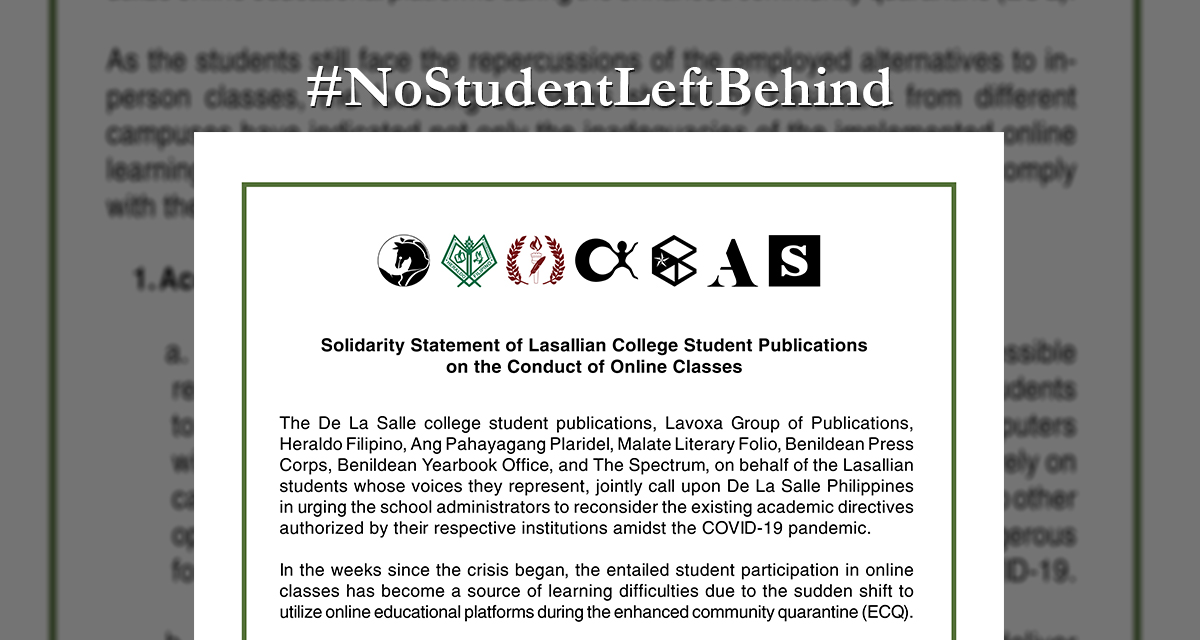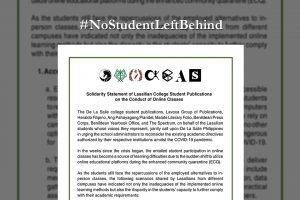

The De La Salle college student publications, Lavoxa Group of Publications, Heraldo Filipino, Ang Pahayagang Plaridel, Malate Literary Folio, Benildean Press Corps, Benildean Yearbook Office, and The Spectrum, on behalf of the Lasallian students whose voices they represent, jointly call upon De La Salle Philippines in urging the school administrators to reconsider the existing academic directives authorized by their respective institutions amidst the COVID-19 pandemic.
In the weeks since the crisis began, the entailed student participation in online classes has become a source of learning difficulties due to the sudden shift to utilize online educational platforms during the enhanced community quarantine (ECQ).
As the students still face the repercussions of the employed alternatives to in-person classes, the following scenarios shared by Lasallians from different campuses have indicated not only the inadequacies of the implemented online learning methods but also the disparity in the students’ capacity to further comply with their academic requirements:
Accessibility
- Electronic devices and internet connection have not been an accessible resource among all households across varied locations, forcing some students to rely on mobile data connections or risk leaving their homes to rent computers with stable internet. Among them are Lasallian scholars who mostly rely on campus resources and other infrastructures and who are now left with no other option but to venture outside their homes. This situation is particularly dangerous for students residing in areas with high risks for contacting COVID-19.
- The sustained conduct of online classes obliges students to deliver requirements that cannot be accomplished due to the ECQ. These include media and arts production, thesis development and experimentation, data gathering from different sites required by their studies and other practical assignments that entail in-person collaboration among team members.
Quality education
- Learning is generally inefficient for several courses when delivered through online classes as students gain limited understanding of the lectures that were merely carried out through uploaded modules and video presentations among other kinds of recorded educational content.
- Online instruction does not suffice for the classes that involve the use of campus facilities such as the multimedia, science, engineering, medical, and cooking laboratories. An online platform is not a conducive space to cater to skill-based degrees which are largely embedded within the benchmark courses of De La Salle schools.
Students’ well-being
- Students who may belong in families directly affected by the increasing spread of COVID-19 are troubled by an added burden of school responsibilities on top of their existing struggles. These are Lasallians whose academics can not be prioritized over their heightened obligations in attending to their family members who may be COVID-19 patients themselves while still managing to acquire basic living necessities.
- The toll of online classes on the mental health and well-being of students during the extremely uncertain climate of a pandemic aggravates one’s stress and anxiety levels which pose a lot of difficulties in prioritizing academic requirements. Lasallians who may already have existing medical and mental health conditions and those who may belong in abusive domestic environments are also the most at risk during these times.
These scenarios have been raised by the different Lasallian student organizations through published articles, editorials, formal correspondence and numerous online petitions throughout social media in the hopes of having such concerns acknowledged by the schools’ administrations.
However, these student-led movements to communicate their grievances appear to have been downplayed by the educators leading in decisions being made for the students to continue the conduct of online classes and instruction for new academic requirements during the ECQ.
We disapprove of the schools’ lack of concrete support for the difficulties faced by the students being the primary stakeholders of the Lasallian education system. The nuances of the current living situations students have been coping with since the unforeseen COVID-19 pandemic demand for a modification of the current learning policies and guidelines across the different La Salle campuses.
Hence, the Lasallian publications recommend the following courses of action to fairly address the aforementioned student grievances:
1. Immediate suspension of online classes
The uncertainty surrounding the extent of the ECQ and the other possible implications of the pandemic speaks for the need to immediately suspend all graded and academic tasks required of students through various online platforms. Obliging the student body to undergo such on the pretext of providing a sense of normalcy is an injustice to students who are encountering various coping difficulties.
As teaching and learning gaps have been raised as problems, cancelling online classes remains as a means to arrive at an impartial ground for all students regardless of their capacity in coping with the crisis.
2. Mass promotion across all degree programs
The scale of the global health crisis undermines the assumption that all students share fair circumstances in working towards their academic goals. With this, implementing mass promotion across all degree programs shall fairly address the disparity among students’ current living conditions.
To implement a deferment of grades for students who would not be able to comply with the demands of home-based learning is a clear manifestation of an inequitable favor towards the privileged and such goes against the value of inclusivity entrenched within the Lasallian ideals of serving the poor. It is only fitting that our schools give equal support and regard for all students.
3. Appropriate partial refund of school fees (miscellaneous fees, facilities and laboratory fees)
With the economy in recession, and most commercial and livelihood activities temporarily halted, consideration for the financial situations of students and their families must be given for them to cope during these challenging times. With this, a partial tuition fee refund of the unused fees within the term is a just and necessary move to be made.
This reiterates that the students are entitled to fully utilize the resources they have paid for. As the current situation inevitably blocks access to such resources, the best course of action is to refund the unused portion of the term or credit it for the upcoming semesters.
St. John Baptist De La Salle left a legacy founded upon the values of inclusivity and compassion for the less-privileged. However, this transition to make use of online educational platforms—though well-intended—has instead become a source of difficulty for our fellow Lasallians who are not as privileged in their means and resources that this online set-up demands.
With all these, our joint publications call upon the collaboration of our school leaders to reinforce hand-in-hand their dedication in building educational communities that demonstrate commitment to young people, especially those who are poor, for inclusivity will only be realized once we ensure that no student is left behind.
As campus journalists who have sworn responsibilities to uphold the rights of the public, especially the students, we demand for all La Salle schools to uphold equal educational opportunities for all Lasallians who face different academic, domestic and individual dilemmas during this pandemic. Collectively, we speak for all De La Salle students who are struggling with the balance between maintaining what is academically required of them, the demands of their households and their individual obligations to prevent the virus from spreading.
Indeed, these are not normal times, and our value for inclusivity, empathy and humanity should remain the top priority of our Lasallian schools, even if doing such would be at the expense of suspending many of our educational proceedings.
[embeddoc url=”http://lavoxa.org/wp-content/uploads/2020/04/Lasallian-College-Publications-Solidarity-Statement_Revised-2.pdf” viewer=”google”]


Tbh, nung nabasa ko ung isang article ng La Salle na may beginning statement na “DLSL Students continue to enjoy right to education thru on-line learning” napaisip agad ako, “tlgang ba na enjoy nung students na may school works during this time of crisis?” Personally kasi feel ko nagbibigay lang ng unnecessary stress and pressure ung online learning ehh since sa face to face sessions plang in the classroom may students na nahihirapan, so pano pa ngayon? And not every one has the luxury and privilege to partake in online learning.
yung feeling na babagsak ka dahil lang sa either mabagal ang signal ng data mo, wala kang pang-load o wala kang sariling gadget na pang-online classes -_- nakakainis, ‘di ba?